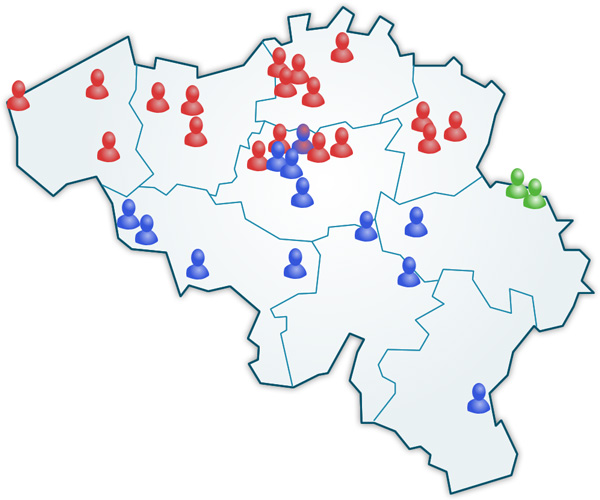Phase 3 : Citizens’ panel
Sample | Phase | Dates | Documents
Sample
The third phase participants have been chosen at random from a list of 400 candidates. All of them have participated in the G1000 Civilians’ Summit, the G-Offs or the G-Home.

Provinces
Antwerp : 5
Limburg : 3
West Flanders : 3
East Flanders : 3
Flemish Brabant : 5
Walloon Brabant : 1
Namur : 2
Liège : 3
Hainault : 4
Luxembourg : 1
Brussels Capital Region : 2
LangueFrench speakers : 12 Dutch speakers : 18 German speakers : 2 |
SexeWomen : 16 Men : 16 |
Education levelHigh school : 12 College degree : 8 University degree : 12 |
Age- 30 years : 7 30 – 45 years : 9 45 – 60 years : 9 60+: 7 Youngest participant : 19 Oldest participant : 66 |
Phase 3 : Citizens’ panel
The G1000 took the format of a Town Hall Meeting. It was a large event designed to facilitate the pooling and sharing of ideas and the elaboration of proposals. Given the fact that each round was relatively short and focused on exploring the diversity around the tables, the ideas and proposals that were launched were still somewhat basic. The third phase of the G1000 project was meant to elaborate these basic ideas, and to further concrete proposals. During three weekends, 32 participants of the G1000 gathered to work out policy proposals.

These 32 citizens were randomly selected from a pool of 491 names. These 491 people were participants of the G1000, G-Offs or G-Home who agreed to be considered as potential participants to the third phase, which meant a significant commitment to participate in each one of the three weekends. The random selection of the 32 was done with a control for diversity in terms of gender, language, region and age, in addition to an ex-post control of socio-economic backgrounds to ensure a large diversity of the group.
This third phase took the form of a citizens panel (also known as consensus conference), which is a design often used in policy processes throughout the world. Such a deliberative design is much more intensive and requires much more skill from the facilitators in order to enable participants to propose specific policies and actions. It is also more open than a citizen summit since the participants have a much greater say in the process itself. In fact, the citizens did have the lead on what precisely they wished to work on (i.e. the choice of the specific questions they wanted to tackle), on how they want to work (i.e. the choice of the experts and stakeholders they wish to question) and above all on what they decided and brought to the public debate.

Dates
The Citizens’ Panel convened on three weekends :
- 14-16 september 2012: Flemish Parliament, Brussels
- 6-7 october 2012: Walloon Parliament, Namur
- 9-11 november 2012: the Members' House of the Federal Parliament, Brussels





